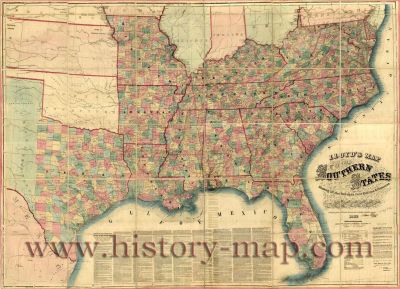 In Georgia, Union General William T. Sherman, hunkered down overlooking Atlanta, gives General George Stoneman free reign to ride south of Atlanta in an effort to disrupt the rebel supply line. Stoneman’s Raid is underway, with Macon as the destination. The disruption of Southern railroads between Atlanta and Macon is the prime objective.
In Georgia, Union General William T. Sherman, hunkered down overlooking Atlanta, gives General George Stoneman free reign to ride south of Atlanta in an effort to disrupt the rebel supply line. Stoneman’s Raid is underway, with Macon as the destination. The disruption of Southern railroads between Atlanta and Macon is the prime objective.
At Petersburg, Union General Ulysses S. Grant‘s probing of the vulnerability of Confederate rails supplying Richmond continues. The weakening of Richmond, as always, is the long term goal. As intended, Grant’s feelers seem to have caused confusion among the Rebel foe.
Collectively, the Union focus on tearing up the rail infrastructure in the vicinities of Richmond and Atlanta bode ill for a Confederacy already reeling from a year of Union victories that have brought the Northern armies to the point of knocking on the door of the two key cities.
Today’s Richmond Daily Dispatch offers the latest war news in the Richmond area, including a report on rumors that Grant has been killed.
Matters along the lines in front of Petersburg were comparatively quiet yesterday until the time of the departure of the train for Richmond. The report that the enemy has crossed any considerable force to the north side of James river has died away, and the people are as much puzzled in regard to Grant’s future intentions as ever. We have received some further intelligence of recent operations which will doubtless prove interesting to the reader. On Friday night and during Saturday there was incessant skirmishing and picket firing, accompanied, at intervals, with heavy cannonading. On Saturday night, from half past 12 to 1 o’clock, there was furious artillery firing from our batteries on the Chesterfield side of the Appomattox.–The discharges were estimated at thirty per minute, and it is thought that not less than forty or fifty guns participated. The earth fairly shook with the reverberations. It was at one time thought that our batteries were shelling the enemy’s mortar lines, but the citizens of Petersburg seem as ignorant of the erase of the demonstration as those living at a distance. The Express says it was stated on Sunday, by an officer who seemed to be well posted, that the cause of the cannonade was an attempt of the enemy to throw a brigade or more across the river under cover of darkness. It was, however, a signal failure, for our men were well prepared to check any such movement. The storm of iron rained upon the Yankees on that night must have amounted to at least a ton, and the noise was perfectly terrific.
On Sunday the usual picket firing and mortar shelling was renewed, and continued until a late hour of the night.
The rumor of Grant’s death was revived yesterday in full vigor, and this time said to be upon the authority of a Washington paper, which announced the arrival of his dead body in that city. All humbug.
Meanwhile far to the west, Helena, Arkansas is also suffering the ill effects of war. Since the occupation of Helena by Union forces in 1862, the city’s Baptist and Methodist churches have been used as hospitals for wounded and sick soldiers.
One inspection of the church-based hospitals reveals:
There were few cots in these two churches; most of the men were lying in the narrow pews, with the scant uneven cushions for their beds. The weather was extremely hot, and flies swarmed over everybody and everything. The faces of some of the men, who were too helpless to keep up a continual fight with them were black with swarming hungry flies.
Helena’s summer heat, humidity and incessant insects result in a spike of sickness. This month, of some 5,500 Union soldiers currently on duty in the city, some 1,000 are listed as sick.
And the summer, to be sure, is far from over … in Helena, Richmond and Atlanta.
Sources: “The War News,” Richmond Daily Dispatch, July 26, 1864 (link); “Hell-in-Arkansas,” Civil War Helena (link); “Union Occupation of Arkansas,” The Encyclopedia of Arkansas History & Culture (link)


